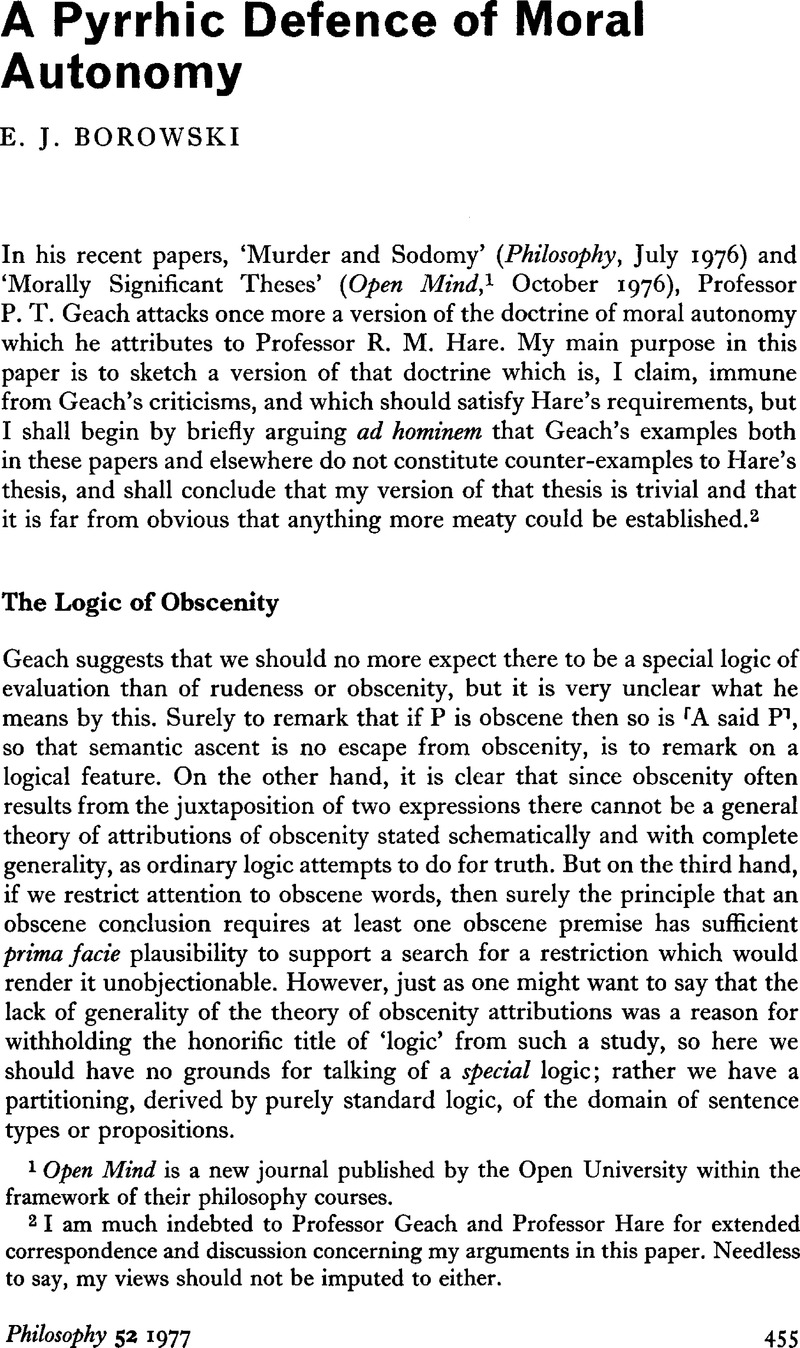Article contents
A Pyrrhic Defence of Moral Autonomy
Published online by Cambridge University Press: 30 January 2009
Abstract

- Type
- Discussion
- Information
- Copyright
- Copyright © The Royal Institute of Philosophy 1977
References
1 Open Mind is a new journal published by the Open University within the framework of their philosophy courses.
2 I am much indebted to Professor Geach and Professor Hare for extended correspondence and discussion concerning my arguments in this paper. Needless to say, my views should not be imputed to either.
3 That there is some misunderstanding in this area is clear from Geach's attribution to Hare of ‘special logical principles for imperatives’ (Logic Matters, 273Google Scholar) while the latter explicitly disavowed this even in his earliest work (‘Imperative Sentences’, Mind 1949Google Scholar; Practical Inferences, 15Google Scholar); he has remarked in various places that the logics of imperatives and indicatives should be isomorphic. If, however, the special principles are those operating between imperatives and indicatives, they are no more applicable to the one than to the other.
4 A similar point is made by Black, Max in ‘The Gap between “Is” and “Should”’ (Philosophical Review 1964)Google Scholar in dismissing these examples in favour of his own. The scope difference is brought out by contrast with ‘If one ought not to do something, one ought not to boast of having done it’.
5 In what follows the nature of the embedded performative will be examined further, but it should be mentioned here that it is difficult to see how else one can interpret Hare's derivation of ‘Take this to the station’ by instantiation from ‘Take all the boxes to the station’ (The Language of Morals, 27Google Scholar) except by interpreting both imperatives as prefixed by ‘I command you’.
6 ‘Imperative and Deontic Logic’, Logic Matters, 9.1Google Scholar. The arguments discussed in the previous section are revisions of arguments in this paper.
7 ‘Imperative Inference’, Logic Matters, 9.2.Google Scholar
8 That there is a gap between the commanding of a conditional and a conditional command as there is between betting on a conditional and a conditional bet is denied by Dummett, in ‘Truth’ (PAS 1958–1959)Google Scholar on the ground that ‘there is only one kind of consequence of giving a command’. One may wish to take issue with Dummett here, but at least it is evident that the issue is not clear cut, and so long as there is room for argument it is possible to reject Geach's account of (1) and maintain that such sentences are ambiguous in some such way as that sketched here.
9 Even the much reviled ‘John will hopefully get here soon’ is rehabilitated on this account as ‘John will, I hopefully tell you, get here soon’. For linguists' arguments from the grammaticality of reflexives, tag questions, et al., see e.g. Ross, J. R., ‘On Declarative Sentences’Google Scholar in Jacobs, and Rosenbaum, , Readings in English Transformational GrammarGoogle Scholar, and Lakoff, R., ‘A Syntactic Argument for Negative Transportation’Google Scholar in Seuren, , Semantic Syntax.Google Scholar
10 Although this is only explicitly argued in ‘Meaning and Speech Acts’ (Philosophical Review 1970Google Scholar; Practical Inferences, 91Google Scholar), Hare has always been aware of the solution to this difficulty. It is implicit in The Language of Morals (37, for example), and explicit in his unpublished prize essay ‘Practical Reason’, where he distinguishes use and mood (Practical Inferences, 22–23).Google Scholar
11 That we should consider the use to which an argument can be put when seeking its basic form is just Hare's point about seeking ‘categorical moral instructions’ (see above).
12 The second condition is required to block the replacement of any P under this rule by ⌜(P v –P)→P‘propositional symbol’ I do not mean ‘propositional letter’; schematic letters do not, of course, occur in real canonical arguments, since they are neither factual nor evaluative. A propositional symbol in this context is any linguistic symbol for an actual proposition, e.g. a sentence token.
13 Some passages of The Language of Morals are argued in these terms (pp. 95 ff, 148, for example)Google Scholar, yet it is also denied (p. 94) that ‘we can decide what is our duty merely by consulting word usage’. How else do we decide what is red, and why should duty be different? Hare suggests that a cannibal could understand a missionary's evaluative language even if they never shared any common judgments (148), but this is to overlook the connection between the two kinds of judgment. As Hare himself says of calling someone happy (Freedom and Reason, 126–127Google Scholar), ‘the appraisals of both [speaker and subject] are involved, but in a different way’. We would not call someone moral whose code we found entirely offensive; and we would not therefore succeed in identifying what functions for him as our moral language does for us.
14 Wittgenstein, , Philosophical Investigations, §23.Google Scholar
- 2
- Cited by


